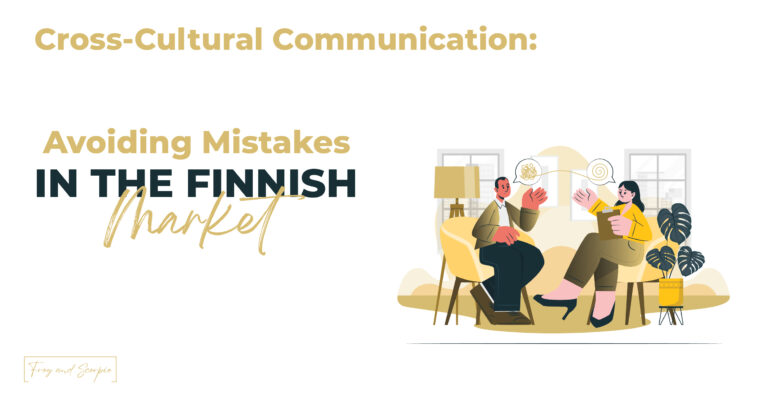In the modern global business landscape, successful companies rely on effective cross-cultural communication.
Whether you’re entering a new market or working with international teams, understanding cultural differences can make the difference between forming strong, productive relationships and facing costly misunderstandings. Each culture has its own communication style, and failing to adapt to these differences can lead to confusion, mistrust, and lost business opportunities.
Cross-cultural communication holds significant importance in Finland, a market where honesty, directness, and respect for personal space form the core of the business environment. While international companies may face challenges in navigating these cultural norms, overcoming these obstacles can lead to greater understanding and collaboration.
By promoting clearer communication with our Finnish colleagues, clients, and partners, we can turn potential misunderstandings into opportunities for connection. This approach allows us to embrace directness while respecting the Finnish preference for silence, ultimately leading to deeper trust and mutual respect.
The goal of this blog post is to assist international businesses in recognizing common communication challenges when engaging with Finns and to provide practical strategies for overcoming them. By adapting their communication styles to better suit Finnish culture, companies can enhance their ability to build trust, foster relationships, and ultimately succeed in the Finnish market.
Common Communication Challenges in Finland
Direct vs. Indirect Communication in Finnish Business Culture
In Finnish business culture, communication is typically direct and to the point. Finns are known for their quiet demeanor, and they value speaking only when they have something important to contribute. This means that silence is a natural part of the communication process, and it’s not uncommon for a Finn to remain silent during a meeting unless they feel it is necessary to interject. This directness also translates to clear and concise verbal communication, where avoiding unnecessary embellishments or small talk is preferred.
Indirect communication, on the other hand, is generally not well received in Finnish business settings. Indirectness may be perceived as evasiveness or lack of transparency. Finns expect honesty and clarity, and when people are overly cautious or indirect in their language, it can create discomfort or distrust.
For instance, making vague statements or offering ambiguous commitments, such as saying “I’ll try” instead of committing firmly, can be seen as insincere. Therefore, when engaging in business discussions in Finland, it is essential to be clear, precise, and forthright in all communications.
Tips for Clear and Concise Communication
-
Use simple, direct language and avoid unnecessary jargon or complicated phrases.
-
Be precise with your intentions and commitments.
-
Respect silence, as it is a natural part of Finnish communication; there is no need to fill quiet moments with unnecessary words.
Hierarchy and Formality in Finnish Business Culture
In Finnish business culture, hierarchy is generally flat. Unlike many other countries where hierarchical structures are pronounced and rigid, Finland’s egalitarian values promote equality among colleagues. Whether it’s an entry-level employee or the CEO, everyone is encouraged to voice their opinions and contribute to discussions. In fact, it is common for people to address each other by their first names, regardless of their position within the company. This practice reflects a commitment to open communication and the belief that all ideas, regardless of their source, are valuable.
While excessive formality is typically avoided, there are situations where it is still appropriate. For example, when interacting with senior executives in more formal settings or with external partners in formal business dealings, it may be polite to use titles like “Mr.” or “Ms.” in initial interactions. Over time, as a relationship develops, switching to first names may feel more natural.
The overall emphasis in Finland is on directness and efficiency, and formality should not hinder these principles. However, respect for the individual remains paramount, and the use of titles or formalities should always be based on context and mutual agreement.
Non-Verbal Communication in Finnish Business Culture
Non-verbal communication plays a significant role in Finnish business culture. In Finland, eye contact, personal space, and gestures all carry important meanings that are often subtle but crucial to understanding the message being conveyed. Eye contact is especially significant, as it reflects honesty and directness, traits that are highly valued in Finnish culture.
When engaging with Finns, maintaining steady eye contact is essential to convey respect and engagement. However, prolonged eye contact may be perceived as aggressive, so it’s important to strike a balance and avoid staring.
Personal space is another key element of non-verbal communication in Finland. Finns value their personal space and are often uncomfortable with physical closeness, especially with people they do not know well. It is customary to maintain at least an arm’s length distance during conversations. In business settings, physical proximity should be kept respectful to avoid making the other person feel uncomfortable.
Misinterpreting these non-verbal cues can easily lead to misunderstandings. For instance, standing too close during a conversation might be seen as an invasion of space or an attempt to dominate the interaction. Similarly, failure to make proper eye contact might be interpreted as a lack of interest or honesty, potentially harming the relationship.
Small Talk and Relationship Building
In Finnish culture, small talk is not highly valued, and people often only speak when they have something important to say. Finns take words seriously, and verbal agreements and promises are seen as binding. This means that casual phrases like “We must have lunch together sometime” are often taken literally, and forgetting them can cause concern.
Finns are known to be better listeners than speakers, and interrupting others is considered impolite. Silence is also an important aspect of communication, with pauses in conversation not causing discomfort. Instead, silence is seen as a natural part of interaction.
When building relationships in business, Finns prefer to engage with those they trust and know well. Once a degree of familiarity has been established, they are open to discussing a variety of topics, including shared hobbies, culture, or sports. Shared interests, particularly in Finnish sports like skiing or ice hockey, can be a great conversation starter. Finns are also well-informed and enjoy discussing current events, particularly those related to the EU. In business settings, it’s important to be direct, clear, and sincere, as trust is built through honest and straightforward communication. Building rapport in Finland may take time, but once a relationship is established, Finns value openness and reliability.
Tips for Engaging with Finns:
• Maintain appropriate eye contact, but avoid staring.
• Respect personal space and keep a comfortable distance.
• Keep small talk factual and avoid overly personal topics until a relationship is established.
• Be direct and clear in your communication.
• Allow silences to occur naturally, and don’t feel the need to fill every pause with conversation.
Strategies for Effective Cross-Cultural Communication
Active Listening and Empathy
Active listening and empathy are key components of successful cross-cultural communication, particularly in Finland, where communication is typically direct and to the point. Finns value clarity and authenticity in conversations, and they appreciate when others take the time to genuinely listen and understand their perspectives. This will help to foster trust and create more meaningful business relationships.
Empathy plays a crucial role in cross-cultural communication. In Finland, people tend to be reserved, and building trust often takes time. Demonstrating empathy helps show that you understand and respect Finnish values and customs, such as the emphasis on personal integrity and straightforwardness.
Acknowledging cultural differences and expressing understanding can significantly impact the development of business partnerships, ultimately creating an environment where both sides feel heard and valued.
By creating an environment of active listening and empathy, international companies can improve their communication effectiveness, facilitating successful ventures in Finland’s distinct and competitive business landscape.
Clarity and Conciseness in Finnish Communication
In Finland, clarity and conciseness are highly valued when it comes to communication. Finnish culture places a significant emphasis on getting straight to the point and avoiding unnecessary embellishments. Finns tend to appreciate clear, direct communication that is efficient and easy to understand. Here are some key tips to ensure your communication is both clear and concise:
- Use the language of your target audience: Avoid using complex terms or jargon unless they are familiar to your target audience. Instead, try to use straightforward expressions. Finns appreciate clear and unambiguous messages, especially in business. By using language tailored specifically to your target audience, you will not only enhance your communication but also ensure that the message will be understood. If you need help understanding your target audience, check out our competitive analysis or strategic communication services.
- Be Direct: Finns value directness in communication. Avoid beating around the bush or using vague expressions. When you have a point to make, state it clearly and without hesitation. This will help build trust and ensure your audience understands exactly what you are trying to convey.
- Avoid Over-Explaining: While it’s important to be clear, brevity is just as essential. Finns generally appreciate when information is presented efficiently, so avoid over-explaining or offering excessive details. Stick to the most relevant points and avoid unnecessary filler that doesn’t add value to the conversation.
- Offer Context: Even though Finns prefer directness, it’s still important to provide some context and background information to ensure your message is fully understood. This is especially important in professional settings, where decisions often rely on well-grounded information. Providing context will help your audience connect the dots and better understand the reasoning behind your ideas.
Respect for Silence in Finnish Communication
In Finnish culture, silence is not something to be feared or filled with idle chatter. It is an essential element of communication that reflects the Finnish values of thoughtfulness and respect. Silence is often seen as a natural part of conversation, allowing individuals time to process information, reflect on the discussion, and form considered responses. In Finland, it is considered inappropriate to rush to fill silences, as doing so may come across as impulsive or disrespectful.
Interrupting or attempting to fill silences during a conversation can be seen as disruptive and inconsiderate. Finnish people prefer to listen attentively and respond only when they have carefully thought about their words. This preference for silence reflects their culture’s emphasis on authentic communication. Therefore, rather than viewing a pause in conversation as awkward, it’s important to recognize silence as a sign of respect and an opportunity for reflection.
Cultural Sensitivity and Awareness
When doing business in Finland, it is essential to understand and respect the cultural norms of communication. Finnish society is built on principles of equality, honesty, and modesty, which strongly influence how people interact both in personal and professional settings.
For instance, personal space is highly valued, and direct communication is expected. By becoming aware of these cultural nuances, you will be able to engage in a manner that is both respectful and effective.
For a successful presence in Finnish business culture, it’s important to adopt a mindset of cultural sensitivity. Familiarizing yourself with Finnish customs and values will allow you to avoid unintentional missteps. A key aspect of this is learning the importance of punctuality, honesty, and the need for clear communication. Understanding these values will help you build rapport and trust with your Finnish counterparts. Taking the time to understand and respect these cultural markers will also demonstrate your commitment to forming genuine and productive relationships.
Feedback and Open Communication
Open and honest communication is a cornerstone of Finnish business culture. When engaging with Finnish colleagues, it’s important to seek feedback and maintain transparent dialogue to ensure mutual understanding. Feedback is often provided in a direct and constructive manner, and Finns expect others to accept it in the same spirit. To foster clear communication, it’s important to be open to receiving feedback and to act upon it.
When offering feedback, be clear and precise. Finns value constructive criticism, but they expect it to be communicated respectfully and in a way that encourages improvement rather than causing offense. Similarly, when receiving feedback, it is essential to remain open-minded and professional. Avoid taking feedback personally and focus instead on growth and improvement.
To ensure effective communication, encourage an environment of openness, where questions and clarifications are welcomed. This fosters trust and ensures that all parties understand each other’s perspectives, promoting more productive collaborations.
Conclusions
Effective cross-cultural communication is essential for international businesses looking to succeed in Finland’s unique market. Understanding and adapting to Finland’s communication style – direct, concise, and transparent – can help prevent misunderstandings and foster trust in business relationships. The Finnish appreciation for honesty, clarity, and respect for personal space must be acknowledged and incorporated into communication practices to ensure successful interactions.
For international companies, the key to thriving in the Finnish market is adapting communication styles to reflect these cultural norms. Employing directness, clarity, and respect for silence, while understanding the value Finns place on personal space and equality, can improve your ability to build rapport and strengthen business ties.
Effective communication is not just about avoiding mistakes but also about building strong, meaningful relationships that stand the test of time. When you engage with Finns in a manner that aligns with their values, it leads to greater trust, stronger partnerships, and ultimately, business success.
To further enhance your understanding of Finnish business culture, contact us and we will design a service package that suits your company’s needs.





